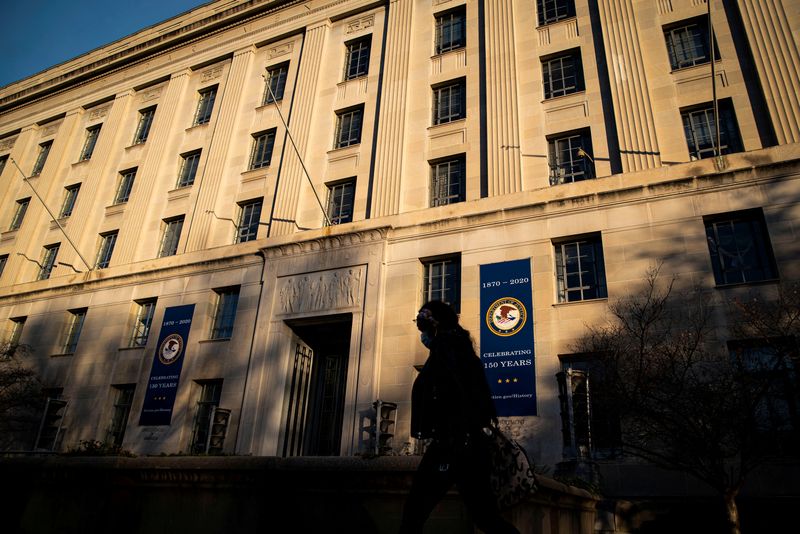By Marisa Taylor and Mike Spector
WASHINGTON (Reuters) - The U.S. Justice Department has opened a criminal investigation into Cassava Sciences (NASDAQ:SAVA) Inc involving whether the biotech company manipulated research results for its experimental Alzheimer's drug, two people familiar with the inquiry said.
The Justice Department personnel conducting the investigation into Austin, Texas-based Cassava specialize in examining whether companies or individuals have misled or defrauded investors, government agencies or consumers, according to the sources, who spoke on condition of anonymity. The sources did not provide details of the focus of the probe and whether the department was looking into any specific individuals.
As in any Justice Department investigation, this one could lead to criminal charges or be closed without any charges being brought.
In an emailed statement, Kate Watson Moss, a lawyer representing Cassava, neither confirmed nor denied the existence of the Justice Department criminal probe.
"To be clear: Cassava Sciences vehemently denies any and all allegations of wrongdoing," Watson Moss said, adding that the company "has never been charged with a crime, and for good reason - Cassava Sciences has never engaged in criminal conduct."
Watson Moss added that Cassava Sciences has received confidential requests for information from government agencies, but declined to identify those agencies. Watson Moss said that "Cassava Sciences has provided information in response to these requests in full satisfaction of its legal obligations." Watson Moss added that no government agency has accused the company of wrongdoing.
A Justice Department spokesperson declined to comment.
The company already was facing scrutiny from the U.S. Securities and Exchange Commission and investors after two physicians from outside Cassava last year made allegations of data manipulation and misrepresentation involving research underpinning the company's Alzheimer's drug, called simufilam.
Cassava, a small company with about two dozen employees, in a statement last year called the allegations of data manipulation and misrepresentation "false and misleading."
Cassava on its website describes simufilam as taking an "entirely new approach to treating Alzheimer's, the most common form of dementia and a progressive brain disorder that affects nearly 6 million Americans. The oral medication restores the normal shape and function of a key protein in the brain, the company said.
A PETITION TO THE FDA
The criminal investigation began, according to the sources, sometime after a petition was filed in August 2021 with the U.S. Food and Drug Administration by a lawyer on behalf of two physicians asking the agency to halt clinical trials of simufilam. The physicians are David Bredt, a neuroscientist formerly at Johnson & Johnson (NYSE:JNJ)'s Janssen, and Geoffrey Pitt, a cardiologist who serves as director of Weill Cornell Medicine's Cardiovascular Research Institute in New York.
The petition filed by Jordan Thomas, a New York-based lawyer representing both doctors, said Cassava's published studies on clinical trials involving simufilam in various journals contained data misrepresentation and images of experiments that appeared to have been manipulated by photo-editing software. The FDA denied the petition and let the trials proceed. Bredt and Pitt disclosed last November in an article published by The Wall Street Journal that they shorted Cassava's stock, betting that the price would go down once investors learned of the manipulation they alleged. They later told The New Yorker magazine that they no longer have a short position in Cassava, a claim Reuters could not independently verify.
The short-selling represents "a major conflict of interest," Watson Moss said in her statement to Reuters.
"Cassava Sciences is interested in helping those with Alzheimer's disease, not an easy payday," Watson Moss added.
STOCK DROP
Cassava's stock fell precipitously following the petition filed with the FDA by Thomas, presenting an opportunity for Bredt and Pitt to profit on their bet against the company.
Thomas declined to comment on the matter.
The FDA in February said the so-called citizen petition filed by the two physicians urging it to launch an investigation into simufilam was not a proper avenue for such a request. Requests for the FDA to initiate an enforcement action, meanwhile, are "expressly excluded from the scope of the FDA's citizen petition procedures," the agency said, adding that it exercises its own discretion on such matters.
An FDA spokesperson declined to comment.
Cassava shares rose on Nasdaq from around $7 in January 2021 to above $135 in July 2021 on investor hopes that the company was on the verge of a breakthrough in treating Alzheimer's. The stock plunged weeks later following word of the petition questioning Cassava's research results.
The company's shares closed at $21.72 on Tuesday.
Cassava has received more than $20 million from the U.S. National Institutes of Health to support developing simufilam.
The NIH told Reuters it does not discuss potential cases of research misconduct related to grants but that officials "take research misconduct very seriously. Research misconduct may distort NIH funding decisions, the overall integrity of the research we support and the public's trust in science and resulting outcomes."

Cassava also is facing the SEC investigation, the sources said. The Wall Street Journal last November first reported on the SEC probe, saying the agency was examining the claims made in the FDA petition. Reuters was unable to determine what specific claims, if any, drew the agency's scrutiny.
An SEC spokesperson said the agency "does not comment on the existence or nonexistence of a possible investigation."